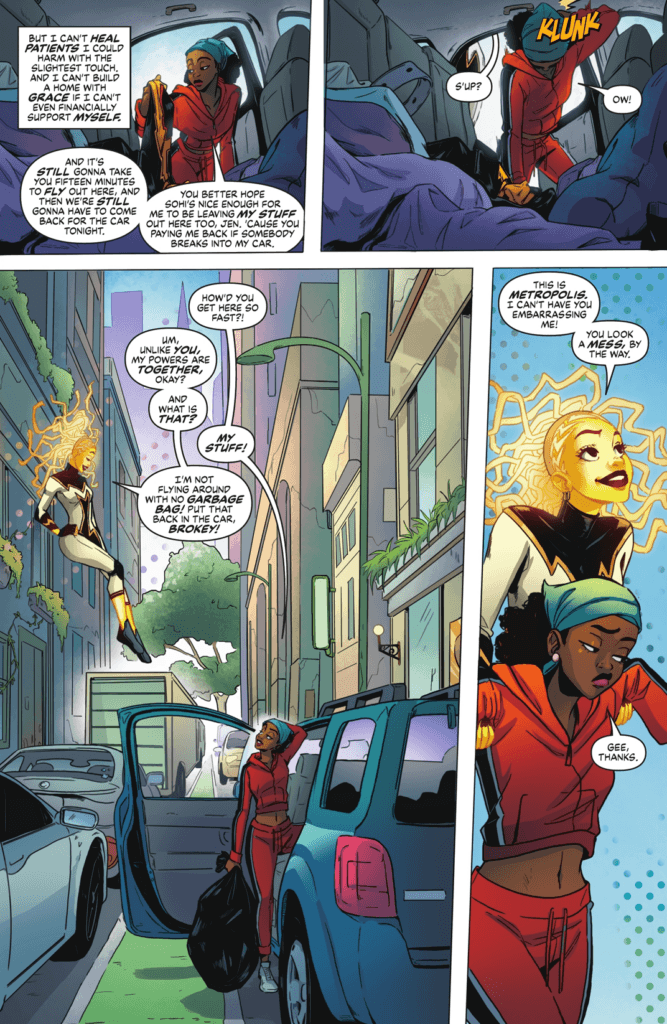deerstalker
https://blacknerdproblems.com/dc-power-2024-spice-of-life-review/
Perhaps against my better judgment, Imma be completely honest with y’all: I am not a DC Girl (TM). It was long ago – in a different place, a different time (it was like 2011) – but at this point, it’s been well over a decade since I’ve felt moved to pick up a DC comic (or tune into a show, if we’re keeping it REALLY honest).
But lemme tell you about how much I love Black women.
Our joy, our quips, our expressions and styles so distinct that they shape culture. The multidimensional magic of our hair and skin. The cadence in which we banter and tell our stories. I promise this is relevant.
Enter DC Power 2024, the second special issue release from DC featuring heroes of color written and illustrated by USSSSS *wiggles eyebrows into oblivion*, and the chance to not only read an advance copy of The Spice of Life (featuring Thunder and Lightning), but also interview the writer, Cheryl Lynn Eaton.
Fam, this comic is Black and funny as FUCK. Our stories told by us just hit different and I felt sisterhood all up and through these panels!
Bonnets! Flat twists! “Put that back in the car, BROKEY!” It just. Hits. Different. I went in knowing nothing about these characters or they daddy (no problem following the story tho, it was very fun), and left with every desire to make them my next hyper-fixation – prepare to be sick of me.
Tiffie Starchild: Hi Cheryl, thank you for taking the time to talk to me today!
Cheryl Lynn Eaton: Oh, it’s not a problem at all – I’m very happy to do so!
Tiffie: This is actually my introduction to these characters-
Cheryl: Oh wow!
Tiffie: Yeah! I’ve heard of them, but I haven’t actually gotten a chance to experience them before; so I wanted to say thank you, first and foremost!
Cheryl: Oh, no problem! This was a dream of mine because I had loved Jen and Anissa from the Black Lightning tv show. I mean, I loved them before, but the show as just like “oh, oh no, I can’t say goodbye to these girls now!” You know, they need to continue on, so it was wonderful to be able to give them a little spotlight, you know, behind the scenes, with this anthology.
Tiffie: Did you feel any pressure because you loved these characters from the show and now, you’re taking the helm of writing them? What was that experience like?
Cheryl: Oh, no pressure at all! Just elation to be able to do it.
Tiffie: Are there any specific challenges in writing comic books versus writing another style?
Cheryl: I think that for this anthology, there’s a balance between having a voice that feels authentic while also incorporating common superhero tropes. I wanted them to come across as girls in the neighborhood – the girls I know, the girls you see at Thanksgiving, at Christmas, at a cookout – I wanted it to feel like that, very much so. I hope that came across in the work.
Tiffie: I think that you absolutely killed that.
Cheryl: Oh, good!
Tiffie: That was part of what made me feel so comfortable reading it. It was partially the illustration of Jennifer’s bonnet – I was like “oo, I’m safe here,” but then the line “put that back in the car, BROKEY!” That took me out! I was like, oh yeah yeah. This is very familiar language, they know what they’re doing, it’s not faked or forced so I really picked up on the authenticity.
Cheryl: It wasn’t even a question! I put the bonnet in there, the braids – so you know it’s a big, huge bonnet, not the little one. The one you get from the beauty supply store-
Tiffie: With that big, wide elastic!
Cheryl: Yup!
Both: *laughs in sisterhood*
Tiffie: Why do you think it’s important for Black people to tell Black stories?
Cheryl: For the authenticity, one, and it bothers me a lot when we are defined by those that are not us. I think it’s important for everyone to tell every type of story. But, it’s very important to have – especially people from marginalized groups, especially Black people – to be able to tell our own stories so that we can define ourselves because it’s been so long that we’ve been demonized in the public eye. So when we have the power to tell our own stories, we have to grab it. It’s almost like you’re working against the grain because there’s been so much negativity, so when you have the opportunity to write a story – and just a true story to show us in our true light – you have to take it. You have to run for it.
Tiffie: Oh, I feel like that’s a message. How do you want people to feel when they read The Spice of Life?
Cheryl: I just want them to have a good laugh and feel familiar. I want it to feel familiar to people who read it.
Tiffie: Are there any other DC characters that you would like the opportunity to write for?
Cheryl: Yes! I don’t think she counts as DC. There’s Voodoo, who was a Wildstorm character. Who is basically like if you took Megan the Stallion and Cardi B and mixed them, you would get Voodoo. Former exotic dancer that discovers that she’s an alien superstar – Voodoo is top-tier. Since I was young, I wanted to write for Voodoo. Obviously Starfire.
Tiffie: YESSS!
Cheryl: I feel like I’m coming across “every Black character” but Starfire’s.. orange.
Tiffie: You know what? You’re not wrong!
Cheryl: So, you know, there is some variety in there. And also, Red Hood. Jason Todd, former Robin. Like I love to hate the character, even though he gets on my nerves. I would love to write him. I would love to put him through the gauntlet.
Tiffie: Where can we find more of you and your amazing writing?
Cheryl: Right now, I have a few things over at the distinguished competition at Marvel. There maaaybe – I don’t wanna get in trouble – there maaaybeee some DC-related things you’ll see in the future. And speaking of fantastic anthologies, there’s the anthology for the Milestone Initiative and that was a blast to do. It’s just the same type of telling stories about girls that you know and neighborhoods you know and old stomping grounds, like in Jersey and Newark. It’s just really nice to be able to do that.
Tiffie: I’m with Black Nerd Problems, and I read The Spice of Life before I read the forward to the (DC Power 2024) anthology, and I love that it aligns so perfectly with my experience as a Black nerd and the experiences of a lot of the Black Nerd Problems audience. Is there anything else that you would like to communicate to them?
Cheryl: Just to try it out! And if they are nerds in other venues – like an anime nerd or a hard sci-fi nerd – to try comics. It’s just a fantastic American art form that I think everyone should dip into – at least a little bit!
And that’s it for me, fam! DC Powers 2024 #1 released January 20, and I can’t recommend it enough! See you next time!
Want to get Black Nerd Problems updates sent directly to you? Sign up here! Follow us on Twitter, Facebook, YouTube, and Instagram!
The post DC Power 2024 The Spice of Life: Cheryl Eaton Talks About Lightning & Thunder’s Slice of Hero Life appeared first on Black Nerd Problems.

















